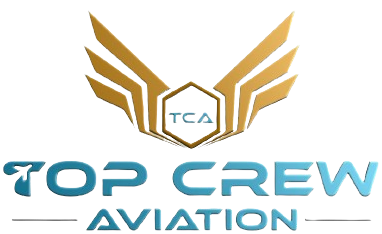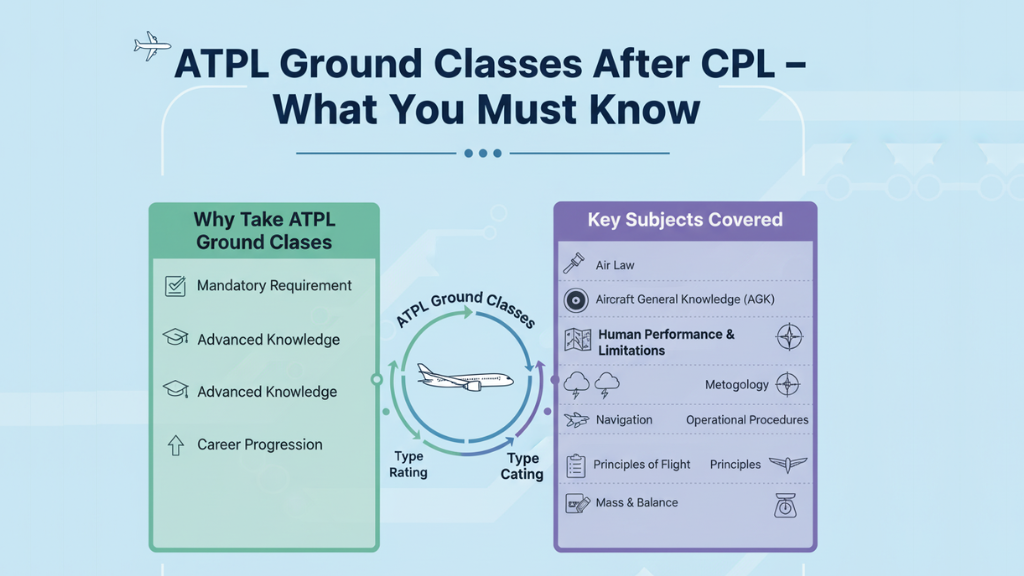You’ve earned your Commercial Pilot License (CPL) — congratulations! You’re now qualified to fly as a professional pilot. But if your dream is to sit in the airline captain’s seat, your journey doesn’t stop here. The next big milestone is the Airline Transport Pilot License (ATPL) — the highest level of pilot certification.
Many CPL holders often wonder, “What comes next? Should I join ATPL ground classes right away?” The truth is, ATPL ground classes after CPL are the essential bridge between your current qualification and your future in commercial airlines.
These classes don’t just help you clear exams — they prepare you for real airline operations, advanced aircraft systems, and complex navigation techniques. They also make you a more confident and competent pilot, ready to handle the responsibilities of multi-crew, multi-engine flight environments.
This blog will walk you through everything you must know about ATPL ground classes after CPL — from understanding their purpose to the syllabus, timing, and best preparation tips. Whether you’re exploring ATPL classes in India, looking for DGCA ATPL subjects, or simply curious about the difference between CPL and ATPL, this guide will give you clear, actionable insights to plan your next move in aviation.
Overview of CPL and ATPL in Pilot Career Progression
Your CPL is like your undergraduate degree in flying — it allows you to work as a pilot for hire. However, the ATPL (Airline Transport Pilot License) is the professional pinnacle, enabling you to captain commercial airliners.
The CPL permits you to act as a First Officer (co-pilot), while an ATPL authorizes you to command an aircraft as a Captain in airline operations. To apply for an ATPL, you need to meet flight experience requirements (usually 1,500 flight hours as per DGCA norms) and pass a series of ground theory exams.
That’s where ATPL ground classes after CPL come into play — they prepare you for these advanced subjects and help you transition from a pilot who “flies aircraft” to one who “manages air operations.”
For aspiring airline pilots in India, enrolling in the Best ATPL ground school is a key step. These schools teach practical aspects of modern aviation — from flight planning and advanced navigation to meteorology and aircraft systems — all aligned with DGCA ATPL subjects.
Simply put, CPL gets you in the cockpit, but ATPL takes you to the captain’s seat. That’s the natural and necessary progression in every professional pilot’s career.
What Are ATPL Ground Classes and Why They Matter
ATPL ground classes are structured theory training programs that prepare you for the DGCA ATPL exams. These classes focus on building a deep understanding of aircraft systems, advanced flight planning, and real-world airline operations.
Unlike CPL theory, which covers foundational knowledge, ATPL theory delves into operational mastery. Topics include advanced performance, flight planning for multi-engine aircraft, and crew resource management — all essential for airline-level flying.
These classes are usually offered by DGCA-approved ground schools and conducted by experienced instructors, often airline pilots themselves. This gives you real operational insights, not just textbook knowledge.
Why do they matter so much?
Because airlines prefer candidates who already hold ATPL (or at least have cleared the theory papers). It shows dedication, preparedness, and a strong grasp of the operational aspects of flying.
If you’re serious about your airline career, enrolling in ATPL classes in India right after CPL helps maintain study momentum. You’ll find it easier to recall your CPL concepts while expanding your knowledge base for ATPL-level challenges.
ATPL Subjects and Syllabus Overview
The DGCA ATPL subjects are divided into three main written exams and one oral test. The written exams are:
- Air Navigation – Covers advanced navigation techniques, flight planning, time-speed-distance calculations, and global navigation systems.
- Radio Aids and Instruments – Focuses on aircraft instrumentation, autopilot systems, radio navigation, and avionics.
- Meteorology – Deals with complex weather systems, upper atmosphere dynamics, and flight-level meteorology for high-altitude operations.
In addition, there’s an Oral (Viva) Exam covering Air Regulations and practical aspects of airline operations.
Each subject is extensive, requiring not just memorization but genuine understanding. ATPL exams test how well you apply theory to real-life scenarios.
Most ATPL ground classes after CPL provide modular training — you’ll go through each subject in depth, often supported by mock tests, DGCA-style question banks, and problem-solving sessions.
Some of the best ATPL ground schools also include simulator orientation and airline-level operational training modules to enhance your practical understanding of the concepts you study.
Eligibility and Timing: When to Start ATPL After CPL
One of the most common questions pilots ask is: “When should I start ATPL classes after CPL?”
Technically, you can begin ATPL ground classes immediately after earning your CPL. However, to apply for the ATPL license, DGCA requires you to have at least 1,500 hours of total flight time and meet specific cross-country and night-flying experience requirements.
So, while you might not yet have the required flying hours, you can still complete your ATPL ground theory early. This gives you an edge because once you have your flight hours, you can directly apply for license conversion without waiting to clear theory exams.
In short:
- Start early – ideally within a few months after CPL.
- Study during flying jobs – many pilots prepare during their line training or instructor roles.
- Don’t delay – the longer you wait, the harder it becomes to recall CPL-level theory.
In India, top institutes like Orient Flights, PTC Aviation, GATI, and NFTI offer structured ATPL classes in India with flexible schedules for working pilots.
How ATPL Exams Differ from CPL Exams
The difference between CPL and ATPL exams lies in both complexity and application.
CPL exams test your foundational knowledge — principles of flight, meteorology, navigation, and regulations at a basic operational level. ATPL exams, on the other hand, assess how you apply those principles in airline environments.
Expect:
- More scenario-based questions.
- Detailed flight planning problems.
- Questions combining multiple disciplines (e.g., meteorology + navigation).
- Emphasis on decision-making and risk management.
The DGCA ATPL exams are known to be challenging — not because they’re impossible, but because they demand a deeper conceptual grasp. That’s why ATPL ground classes after CPL are indispensable. They guide you through advanced question patterns, provide mock exams, and teach effective problem-solving techniques.
In short, CPL exams test your knowledge, while ATPL exams test your understanding and judgment as a pilot.
Study Strategies, Resources, and Recommended Institutes
Preparing for ATPL exams requires discipline and the right strategy. Here’s how to stay on track:
1. Choose the right school:
Select a best ATPL ground school that’s DGCA-approved, with qualified instructors and updated study material. Look for batch flexibility if you’re already flying.
2. Plan your study schedule:
Dedicate daily study hours and break subjects into manageable modules. Consistency beats cramming.
3. Use the right resources:
Study from DGCA-approved books, online question banks, and mock exams. Websites like AviationExam and Bristol Ground School can be helpful.
4. Join discussion groups:
Interact with peers preparing for ATPL. Sharing questions and solving mock papers boosts confidence.
5. Practice DGCA-style questions:
The more you practice, the more you familiarize yourself with the exam format.
Some of the reputed ATPL classes in India include:
- PTC Aviation Academy (Chennai)
- Orient Flights (Mysore)
- GATI Aviation (Delhi)
- Indigo Cadet Training Partners
Each offers structured ATPL exam preparation programs tailored for DGCA requirements.
Step-by-Step Guide to Preparing for ATPL Exams
Here’s a quick roadmap for your ATPL exam preparation:
- Enroll in a DGCA-approved ATPL ground school.
- Collect study materials and familiarize yourself with the syllabus.
- Start with one subject (typically Meteorology or Navigation).
- Attend all classes and revise notes daily.
- Practice DGCA question banks and mock papers weekly.
- Take internal tests at your institute to track progress.
- Apply for DGCA exams once you’re confident in all subjects.
- Clear all theory exams (they remain valid for life once passed).
- Accumulate required flight hours.
- Apply for the ATPL license once both theory and experience requirements are met.
Following this structured plan ensures that your journey from CPL to ATPL is efficient, organized, and goal-driven.
Conclusion
Earning your Airline Transport Pilot License (ATPL) is the defining milestone of your flying career. It signifies expertise, leadership, and readiness to command commercial airliners.
By joining ATPL ground classes after CPL, you equip yourself with advanced knowledge and operational insight — skills that airlines value when selecting their next generation of captains.
Remember, this journey is not just about passing exams. It’s about evolving into a pilot who understands complex systems, makes sound decisions, and ensures safety at every level.
So, don’t wait. Take the next step today — enroll in a reputed ATPL ground school, stay consistent with your studies, and keep your eyes on the captain’s seat.
Your dream airline career is waiting — and ATPL ground classes after CPL are your runway to get there.

